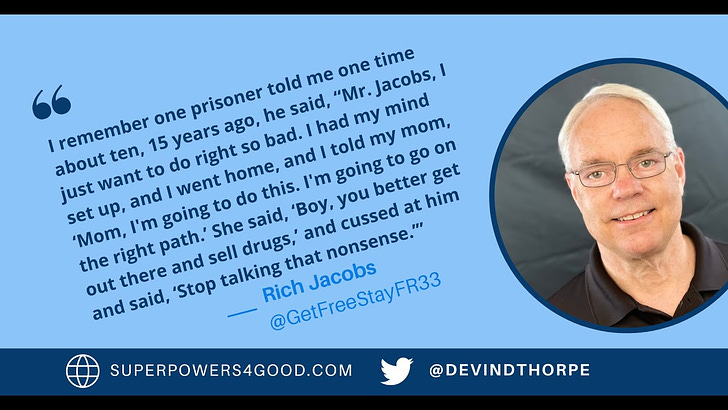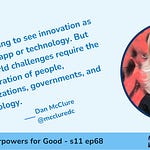When you purchase an item after clicking a link from this post, we may earn an affiliate commission.
Devin: What would you say is your superpower?
Rich: My superpower is that I have empathy.
“Very little hope is inside of America’s prisons,” says Rich Jacobs, founder of Get Free and Stay Free Publishing. “The solution is to saturate the prison system with stories of hope and transformation told only by those who have been incarcerated themselves.”
The first book in the series, a collection of interviews conducted by Yokefellowship Prison Ministries Pastor David M. Lewis, called Get Free and Stay Free, is now available.
The book focuses on returning citizens who have made a success in their lives after paying their debt to society. With about two-thirds of folks released from prison returning within three years, Rich wanted to focus on the one-third who succeed, to provide role models and hope for inmates.
Rich’s full-time job is as a vocational trainer inside a large maximum security prison. He’s been there about 20 years. “Unfortunately, the criminal justice system has become more of a warehousing scenario than a rehabilitation,” he says.
Employing empathy, he’s learned to appreciate the men he works with. “I see some of these guys have a work ethic that you wouldn’t believe,” he says. “If they work that good and hard for $0.19 to $0.42 an hour, imagine what they’re going to do for $15 or $20 an hour.”
“Regardless of how long their sentence is, the reentry should start the first day of incarceration,” Rich says. An old saying in prison is a good guide, “Don’t let the time do you. You do the time.”
“In other words, hang out with the right people. Take advantage of every class or educational experience or vocational experience you can get involved with,” he says.
As returning citizens transition from incarceration to freedom, Rich notes that the judicial system is improving but needs to make more progress. “They’ve already paid their dues. They paid their time. We should be trying to help encourage them to to to succeed when they get out.”
He adds, “I’ve noticed the last five years or so, we’re finally starting to get it.”
He notes that Texas has an unusually low rate of recidivism. “
Their premise is, “All right, partner, you're coming into our neighborhood. You're now our neighbor. Now we're going to do what we can to remove every excuse for you not to go back to prison.
“We're going to help you get a job. We're going to help you get a place to live. But you're going to show up. You're going to be a man.
“We're not your mommy and daddy. We're not going to enable you. We're not going to pity you, but we are going to help you succeed in our neighborhood.”
Rich sees empathy as a key to helping returning citizens succeed. “Be empathetic to the scenario where they’re coming out, and they’re human beings, and they have emotions like us; they’re not caged animals.”
Rich sees the empathy he learned working with incarcerated people as his superpower.
How to Develop Empathy As a Superpower
“I’ve learned how to treat the men with respect but in a no-nonsense kind of way,” Rich says. “I create an atmosphere where we know how to have fun and respect but get the job done.”
He points out that it is hard for those not connected to the justice system to imagine the context that leads people to prison. “A lot of these men were raised in cultures that a lot of folks like yourself and I and your perhaps a lot of your listeners, we just don’t get the type of culture.”
To illustrate, he shared a story:
I remember one prisoner told me one time about ten, 15 years ago, he said, “Mr. Jacobs, I just want to do right so bad. I had my mind set up, and I went home, and I told my mom, ‘Mom, I'm going to do this. I'm going to go on the right path.’ She said, ‘Boy, you better get out there and sell drugs,’ and cussed at him and said, ‘Stop talking that nonsense.’”
Stories like that helped him develop more profound empathy for the inmates. He acknowledges he’s still learning.
“Somebody stole the electric pencil sharpener out of my classroom,” he says of a recent experience. “I got so angry. I made humor out of this for two or three days with my students because—and I told them, you know—in my flesh, it really made me mad.”
As he looked into this, he realized that electric pencil sharpeners are a frequent target of theft. He learned that the prisoners use the motors for tattoo guns. He says empathy allows him to see the human side of such experiences.
You can develop empathy as a superpower by following Rich’s example and insights, allowing you to do more good in the world.
























Returning Citizens Have Paid the Price and Need Our Support